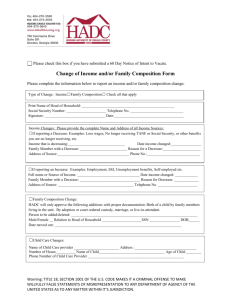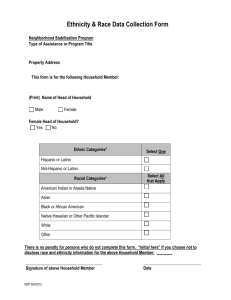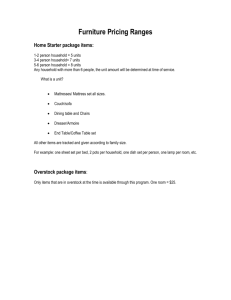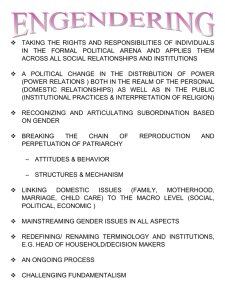Research Journal of Applied Sciences, Engineering and Technology 4(19): 3692-3696,... ISSN: 2040-7467
advertisement
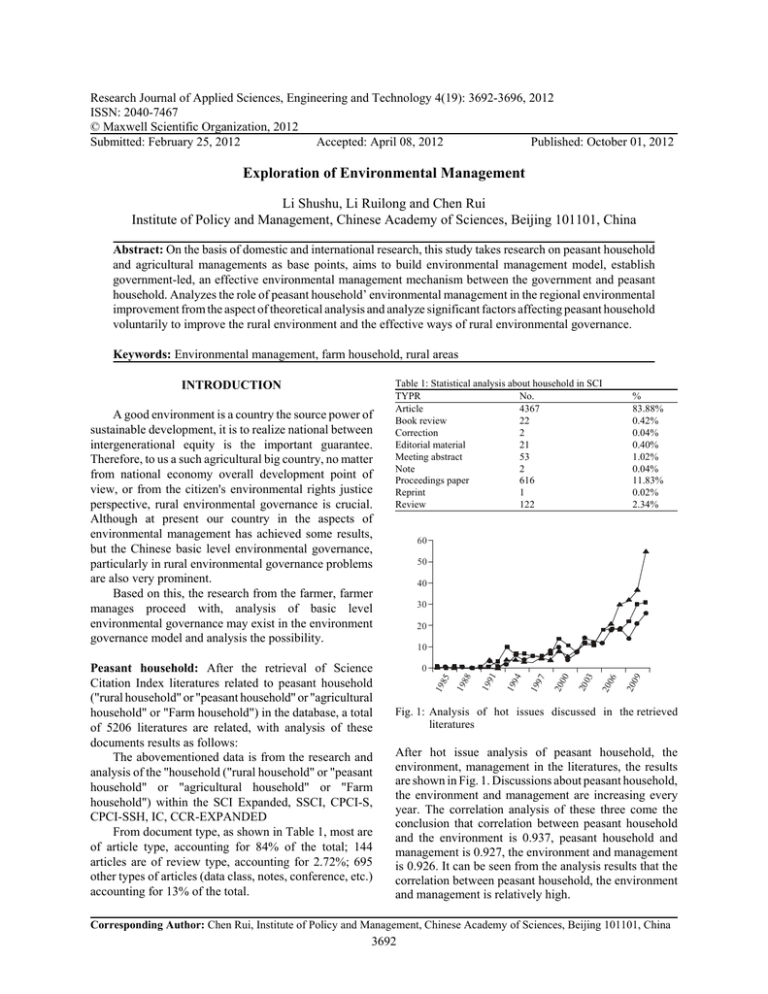
Research Journal of Applied Sciences, Engineering and Technology 4(19): 3692-3696, 2012 ISSN: 2040-7467 © Maxwell Scientific Organization, 2012 Submitted: February 25, 2012 Accepted: April 08, 2012 Published: October 01, 2012 Exploration of Environmental Management Li Shushu, Li Ruilong and Chen Rui Institute of Policy and Management, Chinese Academy of Sciences, Beijing 101101, China Abstract: On the basis of domestic and international research, this study takes research on peasant household and agricultural managements as base points, aims to build environmental management model, establish government-led, an effective environmental management mechanism between the government and peasant household. Analyzes the role of peasant household’ environmental management in the regional environmental improvement from the aspect of theoretical analysis and analyze significant factors affecting peasant household voluntarily to improve the rural environment and the effective ways of rural environmental governance. Keywords: Environmental management, farm household, rural areas 50 40 30 20 10 20 0 9 20 06 20 03 00 20 4 19 97 19 9 91 0 19 Peasant household: After the retrieval of Science Citation Index literatures related to peasant household ("rural household" or "peasant household" or "agricultural household" or "Farm household") in the database, a total of 5206 literatures are related, with analysis of these documents results as follows: The abovementioned data is from the research and analysis of the "household ("rural household" or "peasant household" or "agricultural household" or "Farm household") within the SCI Expanded, SSCI, CPCI-S, CPCI-SSH, IC, CCR-EXPANDED From document type, as shown in Table 1, most are of article type, accounting for 84% of the total; 144 articles are of review type, accounting for 2.72%; 695 other types of articles (data class, notes, conference, etc.) accounting for 13% of the total. % 83.88% 0.42% 0.04% 0.40% 1.02% 0.04% 11.83% 0.02% 2.34% 60 19 88 A good environment is a country the source power of sustainable development, it is to realize national between intergenerational equity is the important guarantee. Therefore, to us a such agricultural big country, no matter from national economy overall development point of view, or from the citizen's environmental rights justice perspective, rural environmental governance is crucial. Although at present our country in the aspects of environmental management has achieved some results, but the Chinese basic level environmental governance, particularly in rural environmental governance problems are also very prominent. Based on this, the research from the farmer, farmer manages proceed with, analysis of basic level environmental governance may exist in the environment governance model and analysis the possibility. Table 1: Statistical analysis about household in SCI TYPR No. Article 4367 Book review 22 Correction 2 Editorial material 21 Meeting abstract 53 Note 2 Proceedings paper 616 Reprint 1 Review 122 19 85 INTRODUCTION Fig. 1: Analysis of hot issues discussed in the retrieved literatures After hot issue analysis of peasant household, the environment, management in the literatures, the results are shown in Fig. 1. Discussions about peasant household, the environment and management are increasing every year. The correlation analysis of these three come the conclusion that correlation between peasant household and the environment is 0.937, peasant household and management is 0.927, the environment and management is 0.926. It can be seen from the analysis results that the correlation between peasant household, the environment and management is relatively high. Corresponding Author: Chen Rui, Institute of Policy and Management, Chinese Academy of Sciences, Beijing 101101, China 3692 Res. J. Appl. Sci. Eng. Technol., 4(19): 3692-3696, 2012 The concept of peasant household is of strong Chinese characteristics, corresponding to different English expressions from different perspectives. When discussing about rural household, it is divided by location, mainly refers to peasant households living in rural areas; regarding peasant household, it is divided by identity, mainly refers to peasant household that does not enjoy any national welfare and the social status is relatively low; regarding agricultural household and farm household (Bu and Han, 2003), it is divided by industry characteristics, refers peasant household mainly engages in agricultural production. Peasant household is rural family-based. The family is a social unit based on marriage and kinship; household can refer to family, or community of interests not related by blood and marriage relationship. In China rural areas, most are families living together based on marriage and blood relationship (Han, 2001). So, from the content, peasant household is farmer family. Peasant household is an organizational unit, refers to a form of organization that the family has rights of control over surplus and rely mainly on family labor force to engage in agricultural production (You, 1999). On this basis, the concept of peasant household extends to a social organization unit that the main family members living and working together in rural areas, mainly engage in agricultural production and business activities, with rights of control over surplus, economic life and family relations are closely integrated (Bu and Han, 2003). From the above analysis we can see that the concept of peasant household is very rich in content, the peasant household in this article refers to rural households living in rural areas, mainly engage in agriculture production, with production and management properties. PEASANT HOUSEHOLD' MANAGEMENT Peasant household management is agricultural production-based management activities; it is the unity of the farm production and management activities. Production is the process to create material wealth, economics defines production as an activity convert input into output, or combine factors of production together to manufacture products. Factors of production include labor; land and capital. The management is to maximize the benefits of activity according to their own situation in their environment. The difference between production and management is: production stresses to make a reasonable allocation of the material factors of production and labor time in the established production process, to ensure that the smooth production and yield maximization. Under the premise that the direction of investment and object of labor are clear, the reasonable arrangement of labor and labor resources, aims at production. Management stresses to maximize profits, make a reasonable allocation of labor and other factors of production according to market requirements, select the direction of investment according to the existing labor and production information, aims at profit. China's peasant household' management has the following characteristics: Peasant household' management and land are closely linked: Living environment of peasant household includes the production environment and living environment, while production environment are mainly involving with agricultural production (Li, 2011). The special nature of agricultural production determine the close linkage between agricultural production and land, requires organizations and individuals engaging in agricultural production to make decisions flexibly and timely according to the natural production needs of living beings, to find the most effective resources allocation scheme. Land is a fixed factor of production, natural factors such as soil and climate are also relatively fixed, which determine that agricultural production shows strong adaptability to location and living beings, cannot change the plant structure freely, but depends on the land to conduct production and management. Peasant household' management relies on the production of the peasant household: Agricultural production is of no separability, the contribution of all inputs to production cannot be judged and measured in the production process, thus it is difficult to carry out effective supervision and incentives, makes allocation of the proceeds difficult to be effective (Li and Zheng, 2007). Only can we evaluate whether the allocation of input elements are reasonable or not in output efficiency, whether change the allocation of elements is able to achieve greater efficiency. Peasant household' management is an adaptive choice for the family: The family management uses marriage, blood relationship to change family members into the community of interests. What peasant household management pursues is to maximize consistent "utility" and "profits". Peasant household natural stability is not to pursue "profit" maximization, but natural, economic, social, institutional constraints makes the peasant household can only ensure ecurity, subsistence utility maximization first, they also need laws in line with Maslow's "Hierarchy of Human Needs Theory". In the circumstance of a large population with relatively little (arable) land and surplus labor, raise the labor put into land farming "regardless of the cost to such a high level, when they know how to calculate the labor cost, just 3693 Res. J. Appl. Sci. Eng. Technol., 4(19): 3692-3696, 2012 because in the particular case, this surplus labor almost produce no "opportunity cost" or very low "opportunity cost" for them, put the remaining labor into land farming "reward" is in line with the economics more is better than less "principle. For rural households who must first solve the subsistence needs, their consumption with a higher "marginal utility", although from the point of the market producers, they may not have any "marginal revenue". With the establishment of the dominant position of peasant household' management, market and social development makes the currency payment become the only means of payment, its rational performance shows in the pursuit of money income maximization, to ease the cash expenses pressure in production and life. Production costs of peasant household' management may be high, but the organization costs are quite low, which does not require specialized labor monitoring, therefore, the internal transaction costs arranged by peasant household management are lower. Peasant household' management has economic and ecological characteristics: Agricultural production is the process of peasant household convert environmental resources -- labor and material inputs into economic benefits, itself has economic and ecological characteristics. From China's peasant household management system changes, economic and ecological characteristics of peasant household' management have always been a symbiotic relationship, due to low levels of productivity, peasant household management dominates with the household contract responsibility system. As developed always, with the improvement of productivity, the existing allocation of resources has reached the optimal combination, without access to new technologies and new factors of production, it is difficult to maintain strong economic growth and the strong position of economy in peasant household' management began to falter; without sufficient attention to ecological characteristic, makes it fail to become a factor of production into agricultural production; the ecological existence makes environmental elements have possibility to be new production resources. The environmental factor is introduced as a new factor of production, changing the original allocation of resources, helping to break the bottleneck in the slow growth of peasant household income, so ecological characteristic in agricultural production began to get enough attention. ENVIRONMENTAL MANAGEMENT Environmental management is the business activities of the costs and benefits of environmental factors endogenous to agricultural production and realizes environmental product value. For rural environmental treatment, environmental management takes rural development as basis, environmental management as a means, to give full play to the role of government and partner organizations, to optimize the allocation and restructuring of the rural environment, economy, society and other various resources, to introduce organizational system, management mechanism management methods and other elements into the supply chain of environmental goods, so that resources can be coordinated and get sustainable development, establish rural management mode with high efficient economic and environmental benefits rural areas as the target. Peasant household environmental management is a rural development model under the guidance of the government, through the adjustment and arrangement of the management system, to mobilize all forces to participate in the supply of environmental goods, to make up for the limited role played by the government, so as to improve the quality of government services and management efficiency, aims to improve the rural environment with supply efficiency of environmental goods. To be specific, in order to adapt to the needs of rural development, government authorities conduct reasonable institutional arrangements and give full play to the regulatory role of partner organizations and the market, integrate government action and peasant household actions effectively, ease the contradiction between behaviors of peasant households and the ecological environment. Its specific features are as follows: Farm environmental management is developed based on peasant household' management: Peasant household environmental management is an institutional innovation set up on the basis of peasant household' management which dominates the household contract responsibility system. Peasant households resource allocation under the household contract responsibility system is optimal; it is difficult to achieve a large growth in income. Peasant household environmental management is to introduce environmental factors into the factors of production, the emergence of new resource elements will inevitably lead to major changes in the original allocation of resources and such changes will further enhance the efficiency of production, to gain a significant increase in income. Peasant household environmental management shows ecological characteristic of peasant household' management: It can be seen from the previous analysis that ecological characteristic of peasant household' management has gradually begun to attract attention, develop in the research process, some areas have formed the prototype of the environmental management. The 3694 Res. J. Appl. Sci. Eng. Technol., 4(19): 3692-3696, 2012 emergence of high-quality agricultural products (organic food, green food and pollution-free food) fully explains the ecological characteristic of peasant household' management can introduce environmental factors into the factors of production and converted to productive resources, to create significant economic benefits. Peasant environmental management reflects environmental values through environmental products: Environmental products have two levels, the first level is products directly produced from the environment, mainly agricultural products as the representative. The second level is the product of environmental services; it is derived from the consumption of agricultural products. Service products are any activities or interests provided by one party to another (Wang and Shan, 2007), they are invisible in essence; and does not render any issue about ownership; its production may be related to actual product, may also be nothing to do with actual product. It has following features: virtual: the service is intangible, before purchasing services, it is difficult to be felt through the senses; difference: the service is a process, so there is no uniform standard, just depends on which service can be provided to what extent, at which place; integrity: service and origin are inseparable, regardless of who provide the source, ultimately manifested by place of origin; can be It can be seen from the above features analysis that, the service product is different from other products, the most essential characteristics is: service product is a process that is dynamic. Measured by the definition and characteristics of service products, environmental products shall be services product. First of all, the environmental products are also virtual and tangible products can be considered and observed by its use value, effect payment after decisionmaking. Environmental products, you must first effect payment to produce and its value in use cannot be observed. Secondly, the environment products are diversified, the environment products offered at the same origin may not have uniform value, it is impossible to make quantitative evaluation of each and per unit environmental values, the quality of service cannot guarantee to be the same. Third, environmental products have integrity characteristic. Quality, quantity and type of environmental products are shown in the origin of the product, if exclude the origin, then the environmental products will cease to exist. Based on the above analysis, the environmental products in this article refer to the output of the environment produced by environmental inputs of labor and capital, a kind of a service product. Environmental products appear after the environment be repaired and improved to a certain extent. As long as environmental products appear, the environment has been repaired and improved, so environmental products of peasant household environmental management reflect environmental values. Peasant household environmental management has the function of rural environmental governance: Compensate for the missing of environmental management entity. Peasant household environmental management system is a kind of management system link the government, peasant household and partner organizations together; in the top-down environmental management system, to foster the initiative of peasant household on rural environmental management, to create a bottom-up rural environmental system, to supplement the missing of environmental management entity in China's existing environmental management system. Reduce administrative costs. Peasant household environmental management aims to improve and repair the rural environment on the basis of protecting peasant household' income, with incentive mechanism to make peasant household change their behavior in agricultural production and rural residence life. To reduce the load of the environment by reducing pesticide and fertilizer use, choose eco-fertilizer and pest control approach; carry out waste separation and recovery, implement the reduction harmless treatment; choose sewage treatment system and reduce the amount of direct discharged sewage and other methods to achieve the goal and effect of environmental governance. It is behavioral changes spontaneously formed by the peasant household under the incentive mechanism that reduces the management costs of environmental governance. Foster the environmental awareness of peasant household. Peasant household environmental management is to establish an incentive mechanism to stimulate the behavior of peasant households, the establishment of incentives makes peasant household to incorporate environmental resources into productive resources for new allocation of resources. Environmental production has integrity feature, requires regional peasant household to achieve together, the peasant households form a community of interests in pursuing their own interests, monitor and manage environmental governance within the region with spontaneous and ultimately establish environmental awareness. REFERENCES Bu, F.D. and X.P. Han, 2003. Connotation of the household management. Contemp. Econ. Res., (9): 37-41. Han, M.M., 2001. Rural Sociology. Peking University Press, China. 3695 Res. J. Appl. Sci. Eng. Technol., 4(19): 3692-3696, 2012 Li, S.S., 2011. Evaluating factors influencing agricultural households willingness to environment productions. Productivity Res., (4): 39-41. Li, Y. and S.F. Zheng, 2007. Agricultural location theory and agricultural industry layout of returning farmland to forestry or pasture regions in west China. Res. Agric. Modernization, 28(2): 147-150. Wang, H. and Y. Shan, 2007. Product composition of media entertainment services. J. Southwest University Nationalities, 187: 169-171. You, X.M., 1999. Farm household. Conceptual Discuss. 5: 17-20. 3696


